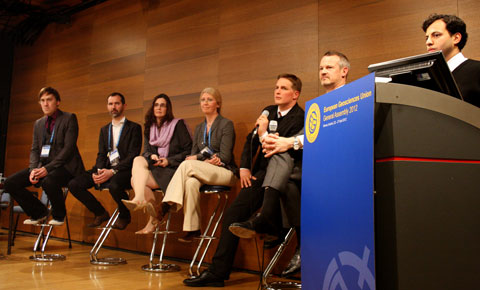Today’s guest post comes from freelance writer Celso Gomes, who also worked at the 2012 General Assembly Press Centre.
Upon admitting that he refused to knowingly associate with Elsevier for years, Cambridge’s award-winning mathematician Tim Gowers stirred a discussion of unprecedented magnitude surrounding Open Access publishing. Such public outcry has so far culminated with over 10.000 other researchers following in his footsteps and vowing to boycott Elsevier journals, and the movement is still gaining momentum. Has the time come for a new publishing paradigm?
The first of this year’s Great Debates explored just that question, starring some of the heavyweights from both sides of the barricade. From the traditional publishing industry, delegates from Elsevier, Springer, and Oxford University Press (OUP) were present; and the Open Access movement was represented by PloS, Copernicus.org and the Open Access Scholarly Publishers Association.
Great Debate on Open Access publishing, including the panelists and chair, Edvard Glücksman of the EGU (far right). Photo: Suzanne Voice
After a quick introduction of the panelists, the debate kicked off by giving voice to a thought that has been on the mind of many researchers: why have the traditional publishers been so resistant to move towards open access? – provocatively suggesting it might all boil down to profit margins. Opinions were as polarised as could be expected but it quickly became clear that profit is just one dimension of a very complex question.
In fact, the case was put forward that there are already several business models in the academic publishing field and not all can successfully accommodate a shift towards open access, with journals in the social sciences and also learned societies-backed journals as two examples. Fields with little to no centralised funding sources would arguably find it financially unsustainable to make the shift from subscription-based to the author pays model, as a significant portion of the individual or group-level research budget would need to be allocated to cover publication costs. On the other hand, the many societies which rely on the steady revenue stream from their publications are (claimed to be) weary of making the shift due to concerns that income from their journals might be significantly reduced or disappear altogether. However, such financial hurdles might be just temporary, as new financial models to back academic publishing are being developed by funders and research institutions themselves.
The discussion moved on to explore what might happen to research communication in the future, driven by the rise to dominance of a much more versatile digital media which has technological tools that challenge the conceptual notion of the research article. Geosciences are a particularly interesting case in this respect, given that the knowledge that needs to be transferred goes far beyond the images and text of the contemporary journal articles – large data sets seem almost ubiquitous and some (incredibly complex) concepts are much better explained in video than in writing. Publishing houses recognise this trend and appear to be experimenting with new formats, but details are sparse at this stage and it is unclear to what extent traditional publishing houses will make content freely available and what will continue to be hidden behind a paywall.
Still, there is a clear sense amongst all the panel members that Open Access publishing (and open science) will eventually rise to prominence , but how fast the changes take place is largely dependent on the researcher’s ability to break free from the current publishing paradigm – will it be gradual or are we witnessing an ‘academic spring’? While there is no answer, there are solid arguments for both cases, which you can revisit in detail by watching the debate in its entirety on the General Assembly’s website.
By Celso Gomes, freelance writer

